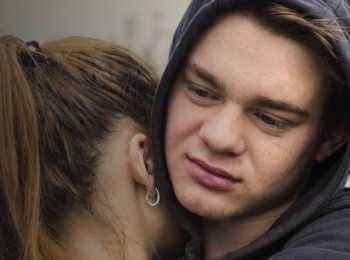Contents
Part 1
When a friend’s parent or sibling dies from cancer
Your reaction: This affects you too
When a friend’s parent or sibling dies from cancer
Everything is ticking along as normal, then boom, the world is tipped upside down. Every cancer story is different.
However it played out in your friend’s family, they have probably already experienced a lot of big changes, heaps of uncertainty and a huge range of strange and confusing emotions. But the death of a parent or brother or sister from cancer is not the end of the story. It can be the start of a new journey through grief that will bring some of the toughest challenges your friend will ever face.
It’s not always easy to be the friend of someone who is grieving. You might feel confused and helpless and be thrown way out of your comfort zone.
But your friend might need people around them now more than ever. Most people who have lost a loved one find that things do eventually get easier and they learn to live with their grief. But it can be a very rocky and lonely path.
You’re not expected to be able to make everything better. It’s OK to be lost for words and to find this whole situation a bit weird. But this information is here to help you understand that a friend who is grieving is still your friend – and that they will find it helpful to have you there through the ups and downs. So just by showing that you care, you’re already awesome!

Your reaction: This affects you too
Whether you knew the person who died really well or not at all, you might be surprised at how much this situation affects you. Hearing that someone in your friend’s family has died can really freak you out. Even though we all know that everyone is going to die eventually, people don’t really think about dying or death all that much.
Being reminded that people we know and love can die can be really scary. It can bring all these big confusing thoughts into your head; like about what death looks like and what, if anything, happens after. You might also feel a bit upset about some changes that have happened in your life since your friend’s parent or sibling died. You might feel like your friend has changed and you can’t talk to them like you used to anymore.
Everyone around you might be acting strange and you might really miss the way things were. It’s also really common to not feel that strongly at all about the death of someone in your friend’s family. This doesn’t mean you’re not a caring person. There is no right or wrong way to feel. Every person will deal with the news differently.
You don’t have to pretend to understand what your friend is going through or feel bad for not being able to fix this for them. You are not the only person who can support your friend and you don’t have to be there 100% of the time. Make sure you take some time out for yourself and get some support too if you need it.
As a friend it’s ok to...
- Feel however you feel, whether your reaction is intense, or you don’t feel much at all.
- Talk or not talk about how you feel.
- Say ‘no’ and not do anything you feel uncomfortable with.
- Change your mind.
- Ignore people who say insensitive things.
- Make mistakes.
- Talk to someone and get support when things feel hard.
- Have your own life, to laugh and have fun.
“It’s very hard to understand how they are feeling and sometimes hard to say the right things. It makes me feel sad but extremely lucky at the same time.”

What is grief?
Grief is the reaction we have to the loss of someone or something that is important to us.
Grief shows up differently in every single person. It can include feelings, thoughts, actions and physical reactions.
People who are grieving don’t always look exactly the way they do on TV; wearing black veils and crying all the time. Lots of people don’t cry at all when someone dies. If they don’t cry it doesn’t mean they don’t care. Grief just affects people differently.
You might think that some of the things your friend does when they are grieving seem a bit surprising, especially if you’ve never really been around a grieving person before.
You might notice your friend doing things like:
- Listening to really sad music.
- Wearing the clothes of the person who died.
- Sleeping or eating a lot, or not sleeping or eating much at all.
- Laughing and cracking jokes.
- Having headaches and feeling sick.
- Going out to party.
- Acting like a little kid again.
- Hiding in their room and wanting to be alone.
- Just carrying on with their usual things like nothing happened.
Grief can be really confusing because there are no guidelines for how it should go. But the truth is, there are no ‘right’ or ‘wrong’ or ‘normal’ ways to grieve. So whatever reactions your friend has are normal for them.
How long does grief last?
You might have heard that there are ‘stages’ of grief that a person moves through until they are over it. But that’s not really how it works.
There is no timetable for when a person should start or stop feeling certain things. It’s more likely that feelings of grief will come and go in waves. Some days your friend will feel fine and like they are getting back on track. Then something will trigger a memory and they might be knocked over by a wave of grief so strong they don’t know which way is up.
There is no easy way to go through grief. A person just has to ride with each up and down as best they can. It may seem a bit frustrating to hear, but grief never really ends. Your friend will never get over the death of a parent or sibling. There will always be a space in their life that nothing else can fill. But over time there will be more good days than bad ones and they will gradually start to feel happy again. This doesn’t mean that they don’t miss the person who died any more, just that they are getting used to them not being around.
“Don’t take anything personally. After losing someone we can be moody, cranky, teary and can get set off by any little thing and it’s totally not your fault. I’ll get better evenutally.”

Grief is not just about death
You can feel grief over anything you have lost, not just people.
Your friend might have experienced a lot of losses, big and small, since someone in their family got cancer. On top of their reaction to the death of someone close, they might be dealing with things like:
- The loss of their old routine.
- Having less time to hang out with friends.
- Having more responsibilities at home.
- Changes to the family dynamic.
- Feeling distant with members of the family.
- More family fights.
- Parents working more.
- Less money.
- Having to move house.
- Falling behind at school, uni or work.
- Missing out on a planned holiday.
- Loss of a sense of security and having new worries, like that someone else in their family will die too.
When someone dies, people don’t only grieve for the loss of that person, but the loss of the future they imagined. Your friend might be feeling grief that their parent won’t be there to see them graduate, that they will never see their sibling grow up and get married one day. The bigger these losses feel for your friend, the harder they can be to adjust to and the stronger their grief will feel.
It might take a while, but things will eventually settle down into a new pattern and feel ‘normal’ again, even if normal doesn’t look the way it did before.
“It would have been nice to have friends keep tabs on me, just to make sure I was OK.”


















